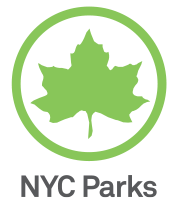
Image credit: NYC Department of Parks & Recreation.
On January 23, 2024, the Parks Department and the City University of New York Graduate School of Public Health and Health Policy shared the findings of a large-scale study of the public health impacts of the Community Parks Initiative. The Community Parks Initiative is an equity-based investment program to build and renovate parks, infrastructure, and community programming in underserved neighborhoods. The program, which launched in 2014, has improved 65 parks citywide, with another 22 projects in active development and twenty more set to begin in the next two years.
The Physical Activity and Redesigned Community Spaces (PARCS) study revealed that renovations and improvements created through the Community Parks Initiative increased the likelihood of New Yorkers spending time in their local parks; the study showed that NEw Yorkers living near a Community Parks Initiative-enhanced park were 66 percent more likely to visit that park than New Yorkers who lived around non-renovated parks. The study showed that park usage increased among adults, which contributes to better physical and mental health. New Yorkers who lived near enhanced parks were 40 percent more likely to spend over 30 minutes there during weekends.
Preliminary findings also showed that the benefits from these investments helped contribute to an improved quality of life for all neighbors around the enhanced parks, not just the people who used the parks more. The study, which began in 2016, included over 2,000 New Yorkers who live within one-third of a mile of an enhanced park.
Following the announcement of the study’s findings, the Parks Department announced the next twenty parks to receive Community Parks Initiative investments in 2024 and 2025. The following parks will receive a combined investment of over $100 million:
The Bronx: Galileo Playground (2024), Washington Park (2024), Harding Park (2024), Fort Independence Playground (2025), Eae J. Mitchell Park (2025), Youth Village Playground (2025)
Brooklyn: Gonzalo Plascencia Playground (2024), Carter G. Woodson Children’s Playground (2024), St. Mark’s Playground (2024), Hattie Carthan Playground (2025), Livonia Park (2025)
Manhattan: Peter Minuit Playground (2024), Holcombe Rucker Park (2024), McKenna Square (2025), Nathan Straus Playground (2025), East River Playground (2025)
Queens: Colden Playground (2024), Hallets Point Playground (2025)
Staten Island: Liotti Ikefugi Playground (2024), Sobel Court Park (2025)
Community Input Meetings for these projects will begin in January. The schedule can be found here.
The University will continue to study the impact of park activation on community public health through the Supporting Parks and Revitalizing Communities Study, launched in Fall 2022.
Parks Commissioner Sue Donoghue stated, “This study demonstrates what we’ve always known: investing in our local parks helps all New Yorkers. Beautiful, well-maintained parks provide spaces for healthy recreation, community building, and connection with nature – so it’s no surprise that, according to these preliminary findings, New Yorkers living near high-quality parks can have a higher quality of life. I’m so excited to bring these benefits to twenty more parks in all five boroughs over the next two years through our Community Parks Initiative, providing more New Yorkers in underserved neighborhoods with safe and beautiful places to play, take in the fresh air, and meet with neighbors.”
Terry Huang, Distinguished Professor of Public Health at CUNY Graduate School of Public Health and Health Policy (CUNY SPH) stated, “CPI is an unprecedented park renovation and equity initiative on a large scale. Parks are a key feature of the built environment, which in turn is critical to the health and wellbeing of people. We at CUNY SPH are proud of the collaboration we have with NYC Parks to understand how parks can improve health and wellbeing in New York City. While the physical improvement has been completed in many neighborhood parks thanks to CPI, this research is continuing and we will learn more about how best to engage communities in activating their parks and neighborhoods in the coming years.”
By: Veronica Rose (Veronica is the Editor of CityLand and a New York Law School graduate, Class of 2018.)

